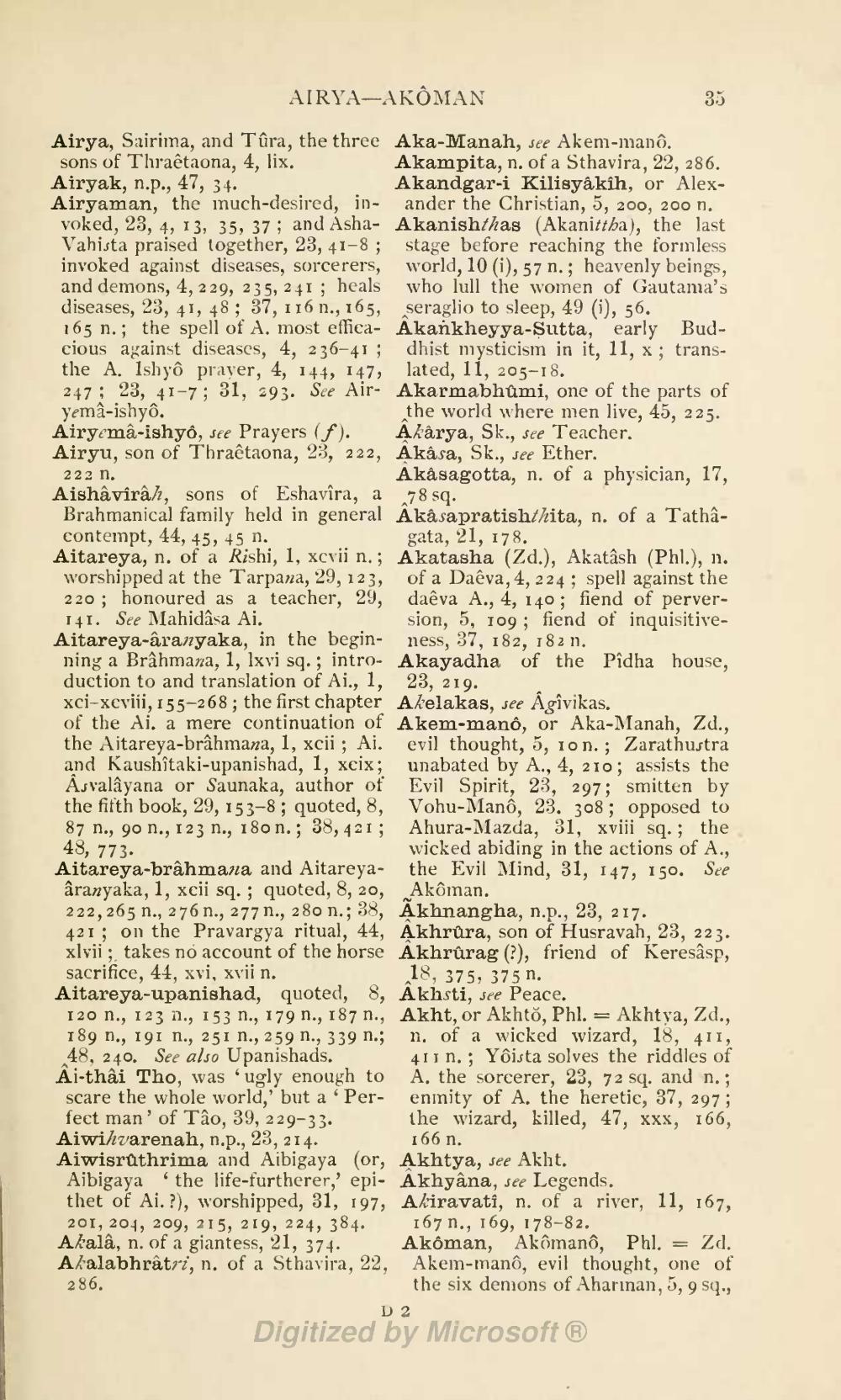________________
AIRYA-AKOMAN
Airya, Sairima, and Tûra, the three Aka-Manah, see Akem-manô. sons of Thraêtaona, 4, lix. Airyak, n.p., 47, 34. Airyaman, the much-desired, invoked, 23, 4, 13, 35, 37; and AshaVahista praised together, 23, 41-8; invoked against diseases, sorcerers, and demons, 4, 229, 235, 241; heals diseases, 23, 41, 48; 37, 116 n., 165, 165 n.; the spell of A. most efficacious against diseases, 4, 236-41; the A. Ishyô prayer, 4, 144, 147, 247; 23, 41-7; 31, 293. See Airyemâ-ishyô.
Akampita, n. of a Sthavira, 22, 286. Akandgar-i Kilisyâkîh, or Alexander the Christian, 5, 200, 200 n. Akanishthas (Akanittha), the last stage before reaching the formless world, 10 (i), 57 n.; heavenly beings, who lull the women of Gautama's seraglio to sleep, 49 (i), 56. Akankheyya-Sutta, early Buddhist mysticism in it, 11, x; translated, 11, 205-18. Akarmabhumi, one of the parts of the world where men live, 45, 225. Akarya, Sk., see Teacher. Akâsa, Sk., see Ether. Akasagotta, n. of a physician, 17, 78 sq. Akâsapratishthita, n. of a Tathâgata, 21, 178.
Airyemâ-ishyô, see Prayers (f). Airyu, son of Thraêtaona, 23, 222,
222 n.
Aishâvîrâh, sons of Eshavîra, a Brahmanical family held in general contempt, 44, 45, 45 n. Aitareya, n. of a Rishi, 1, xcvii n.; worshipped at the Tarpana, 29, 123, 220; honoured as a teacher, 29, 141. See Mahidâsa Ai. Aitareya-âranyaka, in the beginning a Brahmana, 1, lxvi sq.; introduction to and translation of Ai., 1, xci-xcviii, 155-268; the first chapter of the Ai. a mere continuation of the Aitareya-brâhmana, 1, xcii; Ai. and Kaushitaki-upanishad, 1, xeix; Asvalâyana or Saunaka, author of the fifth book, 29, 153-8; quoted, 8, 87 n., 90 n., 123 n., 180 n.; 38, 421; 48, 773. Aitareya-brâhmana and Aitareyaâranyaka, 1, xcii sq.; quoted, 8, 20, 222, 265 n., 276 n., 277 n., 280 n.; 38, 421; on the Pravargya ritual, 44, xlvii; takes no account of the horse sacrifice, 44, xvi, xvii n. Aitareya-upanishad, quoted, 8, 120 n., 123 n., 153 n., 179 n., 187 n., 189 n., 191 n., 251 n., 259 n., 339 n.; 48, 240. See also Upanishads. Ai-thâi Tho, was 'ugly enough to scare the whole world,' but a 'Perfect man' of Tâo, 39, 229-33. Aiwihvarenah, n.p., 23, 214. Aiwisrathrima and Aibigaya (or, Aibigayathe life-furtherer,' epithet of Ai.?), worshipped, 31, 197, 201, 204, 209, 215, 219, 224, 384. Akalâ, n. of a giantess, 21, 374. Akalabhrâtri, n. of a Sthavira, 22,
286.
35
Akatasha (Zd.), Akatâsh (Phl.), n. of a Daêva, 4, 224; spell against the daêva A., 4, 140; fiend of perversion, 5, 109; fiend of inquisitiveness, 37, 182, 182 n. Akayadha of the Pidha house, 23, 219. Akelakas, see Âgivikas. Akem-manô, or Aka-Manah, Zd., evil thought, 5, 10 n.; Zarathustra unabated by A., 4, 210; assists the Evil Spirit, 23, 297; smitten by Vohu-Manô, 23. 308; opposed to Ahura-Mazda, 31, xviii sq.; the wicked abiding in the actions of A., the Evil Mind, 31, 147, 150. See Akoman.
Akhnangha, n.p., 23, 217. Akhrúra, son of Husravah, 23, 223. Akhrûrag (?), friend of Keresâsp, 18, 375, 375 n. Akhsti, see Peace.
Akht, or Akhto, Phl. = Akhtya, Zd., n. of a wicked wizard, 18, 411, 411 n.; Yôista solves the riddles of A. the sorcerer, 23, 72 sq. and n.; enmity of A. the heretic, 37, 297; the wizard, killed, 47, xxx, 166, 166 n. Akhtya, see Akht. Akhyâna, see Legends.
Akiravati, n. of a river, 11, 167, 167 n., 169, 178-82. Akoman, Akômanô, Phl. = Zd. Akem-manô, evil thought, one of the six demons of Aharinan, 5, 9 sq.,
D 2
Digitized by Microsoft R




